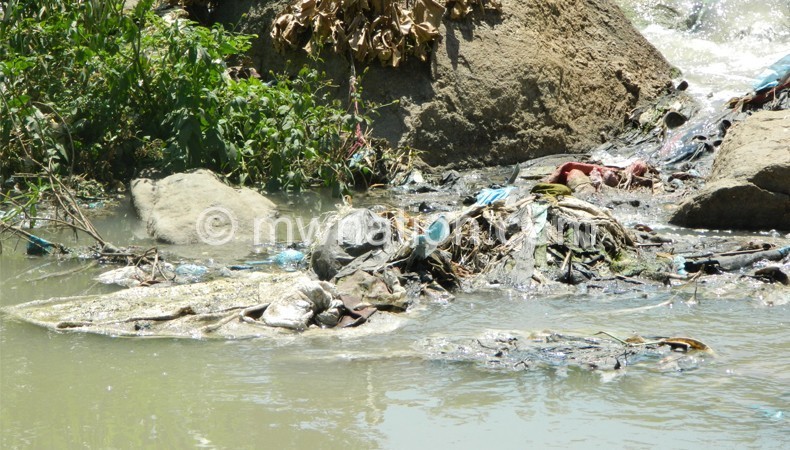Curbing pollution in Blantyre rivers
Foul smell. Plastics. Food wrappings. Dirty water. This is what one comes across at most rivers in Blantyre. A visit to Mudi, Nasolo and Limbe rivers reveal the situation is the same. Considering it is essential for people to have appropriate dump sites to avoid pollution of these water sources, one may ask, where does all this stench and garbage come from?
At Limbe River, two men are seen busy washing heaps of soapy sacks. They claim to have bought the sacks from a company within the Limbe area. The cleaner the sacks get, the more soap and dirt contaminate the river.

A visit to Mudi shows a lot of effluence deposited on the river banks by the recent heavy rains. It is around 11 am, and a man is seen urinating into the river with no shame. With no sign of guilt, he walks away, maybe unaware of the effect of his action.
Meanwhile, a few steps away, Sumani Makiyi searches through the filth, collecting plastics and packing them in sacks that he brought with him. Asked why he is doing that, he says he wants to sell them at some company. Perhaps without knowing it, he is killing two birds with one stone—earning a living and saving the environment by reducing the level of pollution at the river.
Come to think of it, if everyone were to recycle some of these wastes, the environment would be a better place to live in.
With water woes persisting in the city, if such resources were being taken care of, perhaps residents would find an alternative and make use of these resources. But due to high levels of pollution, the water is unsafe for human consumption.
Dr Steven Taulo, a lecturer from the University of Malawi‘s Polytechnic who deals in waste, water and sanitation management, says most of the waste in these rivers is organic matter which comes from domestic places, such as institutions and homes.
“When this organic matter has been discharged into the rivers, there is a process called biodegradation. This biodegradation, which involves the breaking down of organic matter, leads to its multiplication. They use oxygen just like human beings which they get from the river.
“The depletion of the oxygen is what causes the foul smell. Hence, both organic and toxic waste has contributed to the depletion of aquatic life in the rivers,” says Taulo.
He says the biggest culprit in Blantyre is liquid waste, especially sewage. This sewage, which can be easily controlled, is being discharged into rivers through point source pollution, which can easily be seen and controlled.
“Toxic waste from industries is directly taken into the sewage system. These industries are supposed to pre-treat this waste if it is connected to the municipal sewage system. The best remedy is for them to have their own system,” explains Taulo.
He bemoans the polluter pay principle, where polluters are fined a minimal amount which cannot counter the pollution itself.
“How will this curb the pollution? Polluters know they will be able to get away with it,” he says.
This probably explains why most water sources have turned into dump sites. The rivers, which usually run across different areas, are polluted by some at one point while others collect the same water at a different point for household and other use.
Taulo suggests the construction of concrete blocks along rivers to control the flow of water. If the flow of water is controlled, the river can purify itself naturally. This process is called self-purification and can minimise pollution levels.
The Blantyre City Council (BCC) admits that rivers in the city are highly polluted and as part of the ‘Keep Blantyre Clean and Green Campaign’, there are plans to clean these rivers.
But is this a lasting solution to the problem?
According to BCC public relations manager Anthony Kasunda if the sewer system is rehabilitated, the council will pinpoint any industry that is contributing to the pollution.
“At the moment, it is difficult due to vandalised sewer pipes. However, the responsibility should not only be in the hands of the council, but all residents in Blantyre. The sewer system is a public facility and we should all take ownership by reporting vandalism suspects,” says Kasunda.n





